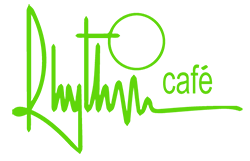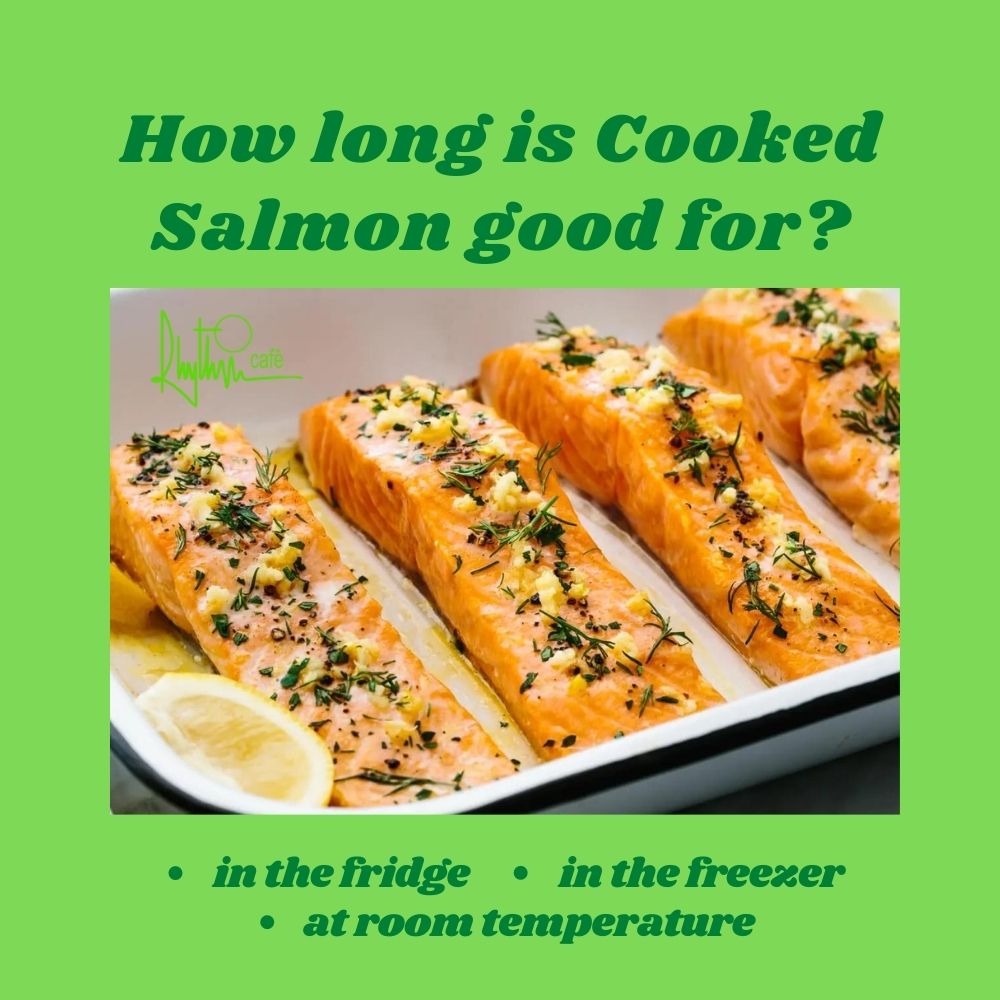Cooking salmon correctly is an essential part of getting the most out of your fish. Not only is it important to ensure that it’s cooked thoroughly and safely, but also knowing how long is cooked salmon good for is key to making sure you get all the health benefits from this superfood. Whether you’re a newbie in the kitchen or a seasoned chef, understanding how long cooked salmon can be stored safely will help you maximize its nutritional value while minimizing risk.
In this blog post, we’ll take a look at the best ways to store salmon and answer any questions about how long does cooked salmon last in the fridge or on the shelf without losing its flavor or freshness!
Short answer about How long is cooked salmon good for
First and foremost, it’s important to remember that cooked salmon should be consumed within 2 days of cooking. It can last up to 4 days in the refrigerator, but make sure you store it correctly by wrapping it tightly in plastic wrap or aluminum foil so no air can get in. If vacuum packing [1] is an option, this is even better as it will help the salmon stay fresh longer.
As for freezing cooked salmon, you can expect it to last up to 3 months in the freezer when stored properly. To freeze cooked salmon, wrap it tightly in plastic wrap and place it in a freezer bag or airtight container. Make sure you label the salmon with the date that it was cooked so you know how long has passed since it was made.
Lastly, if you want to make sure that your cooked salmon is as fresh as possible, buy only what you need and don’t store leftovers for too long. This way, you’ll get the most nutritional value out of this superfood! Don’t forget to always practice safe food handling protocols like washing your hands before and after handling food, and following the proper cooking temperatures for fish.
To learn more about when and how to safely store salmon, tips to prolong the time, continue reading the shares below. It will definitely help you a lot!
How long can salmon sit out?
It is not recommended to leave cooked salmon out of the refrigerator for more than two hours. After this time period, it may become unsafe to consume due to bacteria growth. If you do need to leave your salmon out for longer than two hours, make sure it’s stored at or below 40°F (4°C). Make sure you wrap it tightly in plastic wrap or aluminum foil so no air can get in and potentially spoil the fish.
If you don’t eat all of the salmon within 2 hours, refrigerate the cooked salmon for a later meal.
The best way to store cooked salmon
The best way to store cooked salmon is in the refrigerator to slow down the growth of bacteria. The cold temperatures will help keep the fish fresh and safe for consumption. Make sure you wrap it tightly in plastic wrap or aluminum foil so no air can get in and potentially spoil the fish. Additionally, make sure you label the salmon with the date that it was cooked so you know how long has passed since it was made.
For longer storage, you can freeze your cooked salmon. Benefits of freezing cooked salmon:
- The salmon will last for up to 3 months in the freezer.
- It’s a great way to make sure you have healthy meals ready without having to cook each time you want something nutritious.
- You can also portion out individual servings, which is especially helpful if you are meal prepping for the week.
How long is salmon good for in the fridge & in the freezer? Time chart
Not only cooked salmon but also cooked fish and seafood in general can be stored in the refrigerator for 3 to 4 days or in the freezer for 2-3 months. However, it’s important to note that refrigeration only slows down bacterial growth, and does not entirely prevent it. Therefore, it’s crucial to use the food within the recommended timeframe before it spoils or becomes hazardous to consume.
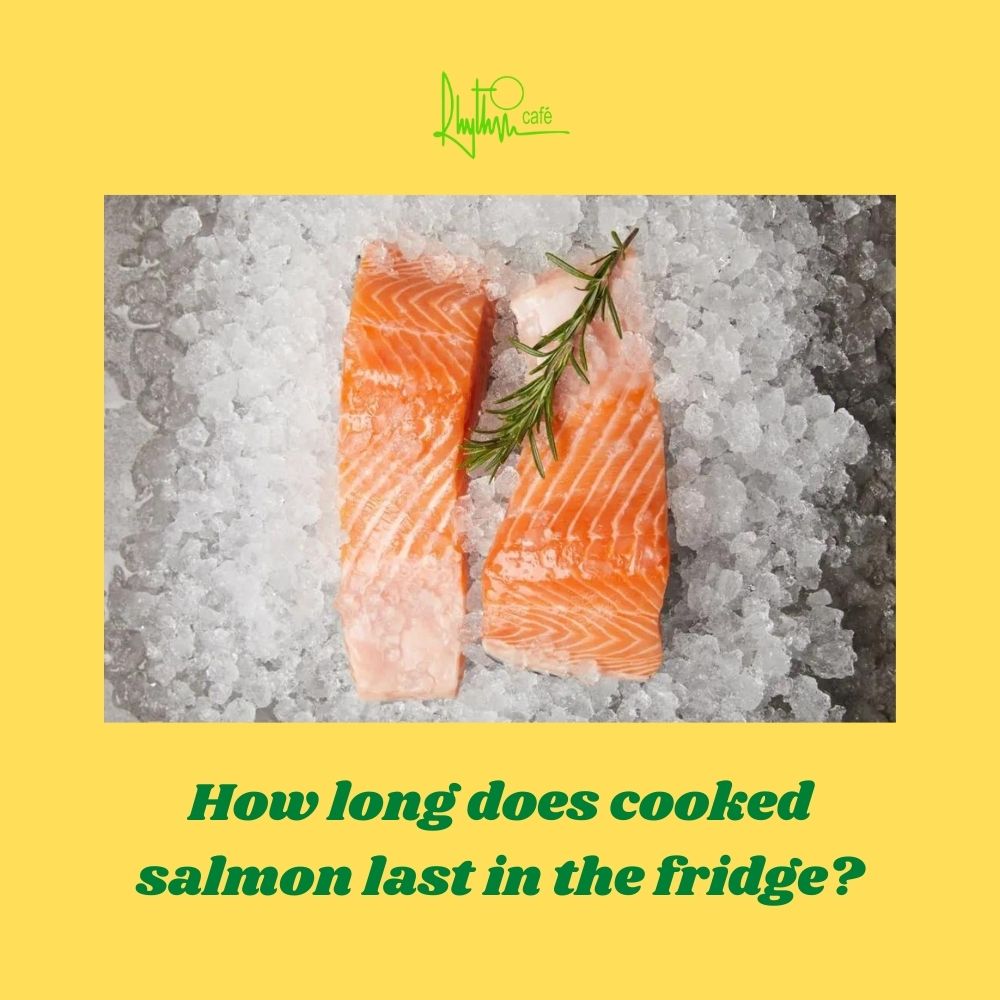
Time chart about How long does cooked salmon last
The length of time that salmon can be stored in the fridge and freezer depends on whether it is cooked, raw, or frozen, and also on how it is stored. Here are some general guidelines:
| Criteria | Room Temperature | In The Fridge | In The Freezer |
| Cooked salmon | 2 hours | 3-4 days | 2-3 months |
| Raw salmon | 2 hours | 1-2 days | 2-3 months |
| Frozen salmon | – | – | 6-9 months |
| Grill salmon | 2 hours | 3-4 days | 2-3 months |
It is important to note that these are general guidelines, and the length of time salmon can be stored may vary depending on factors such as the freshness of the salmon and the temperature of your fridge or freezer. It’s always a good idea to use your best judgment and follow any specific storage instructions provided by the seller or the packaging.
>> See more: How long to Bake Salmon at 375
How do you know if cooked salmon has gone bad?
The signs that cooked salmon has gone bad are generally similar to those of raw salmon. Here are some signs to look out for:
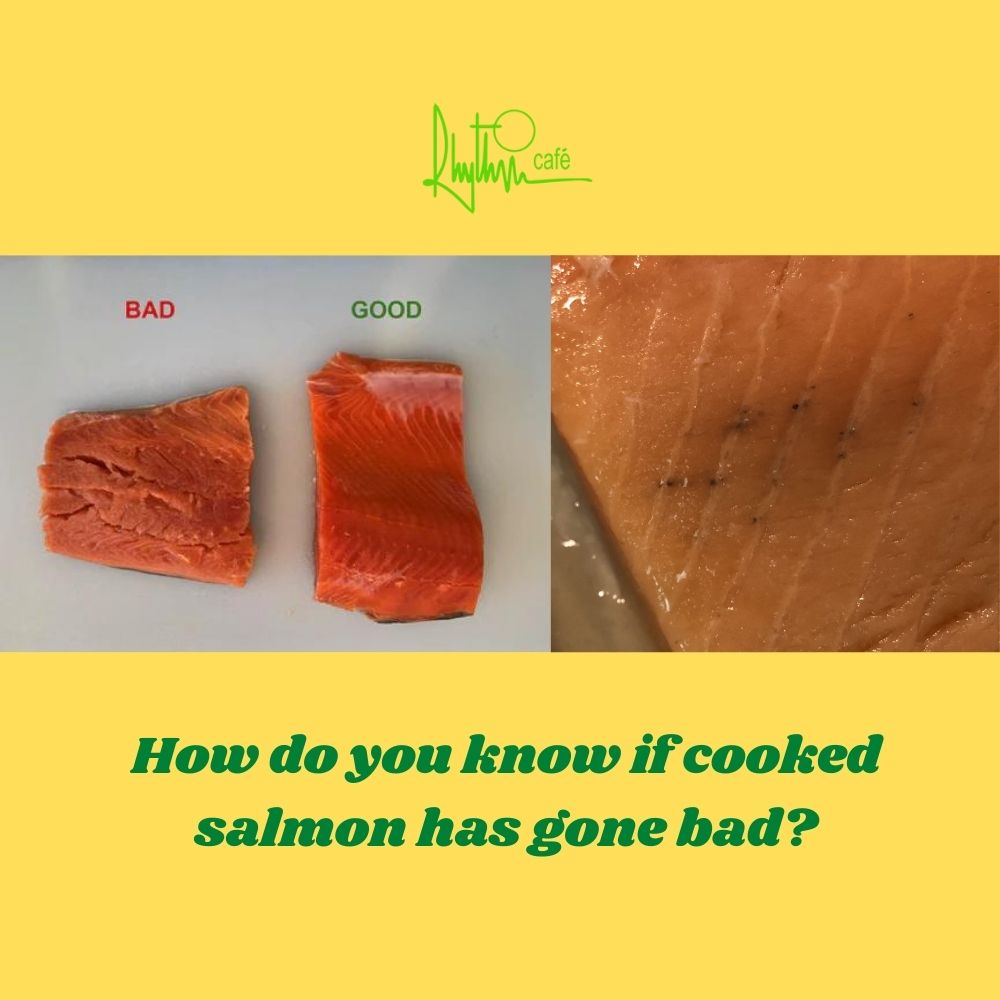
- Smell: Cooked salmon should have a mild, pleasant odor. If the salmon smells sour, sulfurous, or like ammonia, it may have gone bad.
- Texture: Cooked salmon should be firm but tender, with flakes that hold together. If the texture is slimy or mushy, it may be spoiled.
- Appearance: Cooked salmon should have a pinkish color and should be free of discoloration, browning, or dark spots. If the color looks dull or grayish, or if there are any signs of discoloration, it may be spoiled.
- Expiration date: Always check the expiration date on the packaging to ensure that the salmon is still within its safe consumption window.
If you are unsure whether your cooked salmon has gone bad, it is better to err on the side of caution and discard it. Consuming spoiled salmon can lead to foodborne illness, which can cause symptoms such as nausea, vomiting, diarrhea, and fever.
6 tips for storing Cooked Salmon properly
Storing cooked salmon properly is important to maintain its quality and safety. Here are some tips for storing cooked salmon:
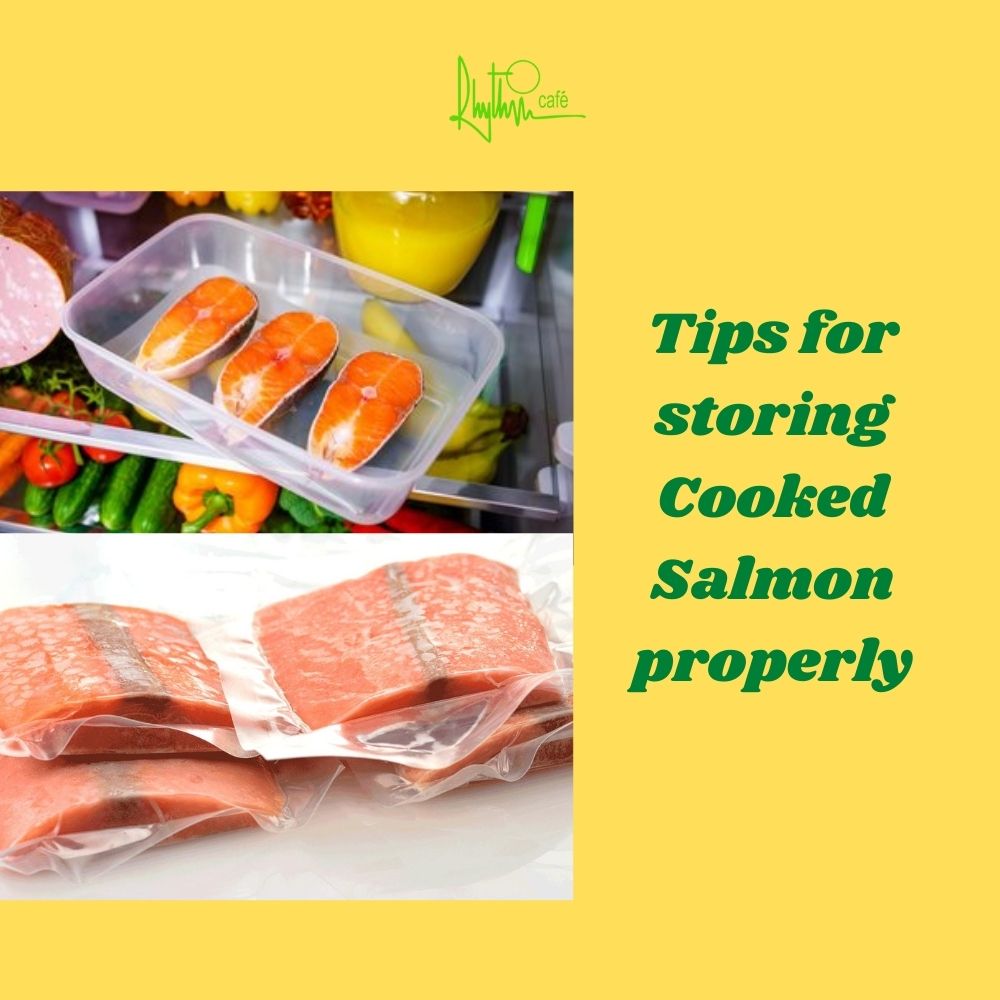
- Refrigerate promptly: Cooked salmon should be refrigerated within 2 hours of cooking. If the ambient temperature is above 90°F (32°C), it should be refrigerated within 1 hour.
- Store in airtight containers: Store cooked salmon in airtight containers or wrap it tightly in plastic wrap or aluminum foil to prevent moisture loss and to keep out air and other contaminants.
- Label and date: Label the container or wrap with the date so you can keep track of how long it has been stored. Portion out individual servings to make meal prepping easier and prevent waste.
- Store in the fridge for up to 3-4 days: Cooked salmon can be stored in the fridge for up to 3-4 days. Place cooked salmon in the coldest part of the refrigerator, ideally at 40°F (4°C) or below.
- Freeze for longer storage: If you want to store cooked salmon for longer than 3-4 days, you can freeze it. Wrap it tightly in plastic wrap or aluminum foil and place it in an airtight container or freezer bag. Cooked salmon can be stored in the freezer for up to 2-3 months.
- Discard leftovers: Leftover cooked salmon should be discarded after 2-3 days. Consuming spoiled salmon can lead to foodborne illness.
How to Thaw frozen cooked salmon?
When you’re ready to eat cooked salmon that has been frozen, it is important to thaw it safely in order to maintain its quality and safety. Here are some tips for thawing frozen cooked salmon:
Thaw in the refrigerator: Place the frozen cooked salmon on a plate or shallow dish and place in the coldest part of your refrigerator overnight. This is the safest and most effective way to thaw frozen cooked salmon.
Thaw under running cold water: If you need to thaw your cooked salmon more quickly, place it in a sealed plastic bag or airtight container and submerge it under cold running water for up to 30 minutes. Change out the running water every 15 minutes to ensure it remains cold.
Do not thaw at room temperature: Do not thaw frozen cooked salmon at room temperature as this can promote bacterial growth. Defrosting the cooked salmon on the kitchen counter could cause bacteria to rapidly multiply, which can lead to food poisoning.
Can I cook frozen salmon without thawing?
Yes, you can cook frozen salmon directly from the freezer with no need to defrost it beforehand. Simply increase your cooking time by at least one-third and check the fish often to ensure it is cooked through. Additionally, make sure to season the salmon with your favorite herbs and spices before cooking for added flavor.
>> See more:
- How long will smoked meat last
- How long can Cooked Bacon sit out
- How long does Spaghetti last in the fridge
How to Reheat cooked salmon?
When reheating cooked salmon that has been cooled or frozen, it is important to do so safely in order to maintain its quality and safety. Here are some tips for reheating cooked salmon:
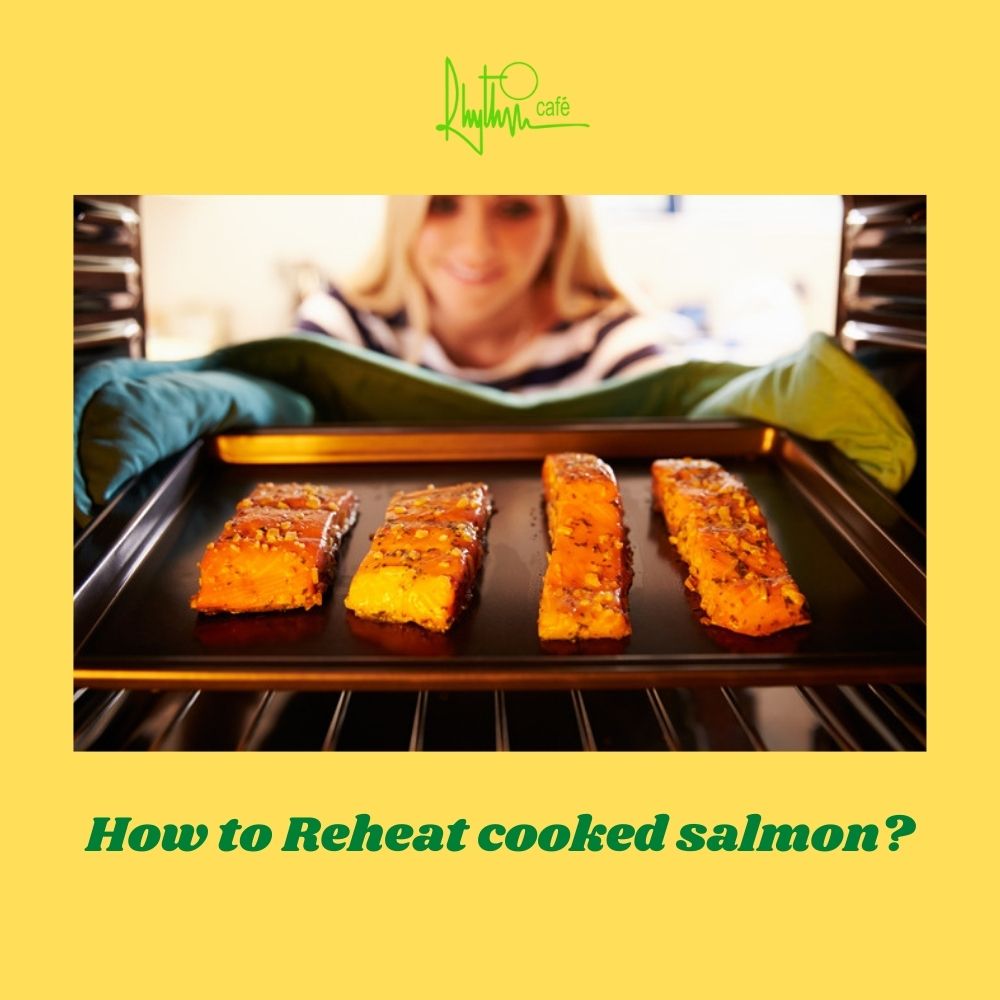
Microwave: Place the frozen cooked salmon on a microwave-safe plate or dish. Cover loosely with a damp paper towel or plastic wrap. Heat on medium power for 1-2 minutes, turning and stirring the salmon halfway through.
Oven: Preheat your oven to 350°F (177°C). Place the frozen cooked salmon on a baking sheet lined with parchment paper. Cover loosely with aluminum foil and bake for 10-15 minutes, or until heated through.
Stovetop: Place the frozen cooked salmon in a shallow dish and cover with cold water. Simmer over low heat for 10-15 minutes, or until heated through.
How to Choose High-Quality Fresh Salmon?
Fresh salmon
When shopping for fresh salmon, look for fish that is firm and bright in color. Avoid buying salmon if it smells fishy or has a slimy texture. Fresh salmon should not have any discoloration or bruising. The flesh should be smooth and moist, and the eyes should be clear and bright.
Frozen salmon
If you are purchasing frozen salmon, look for packaging that is free of ice crystals or frost.
Be sure to check the label when purchasing salmon to ensure it was harvested sustainably and responsibly.
Wild-caught salmon vs. Farmed salmon
Wild-caught salmon is generally considered higher quality than farmed fish, but this depends on where the fish was sourced, how it was handled and stored, and the overall environmental impact of its production.
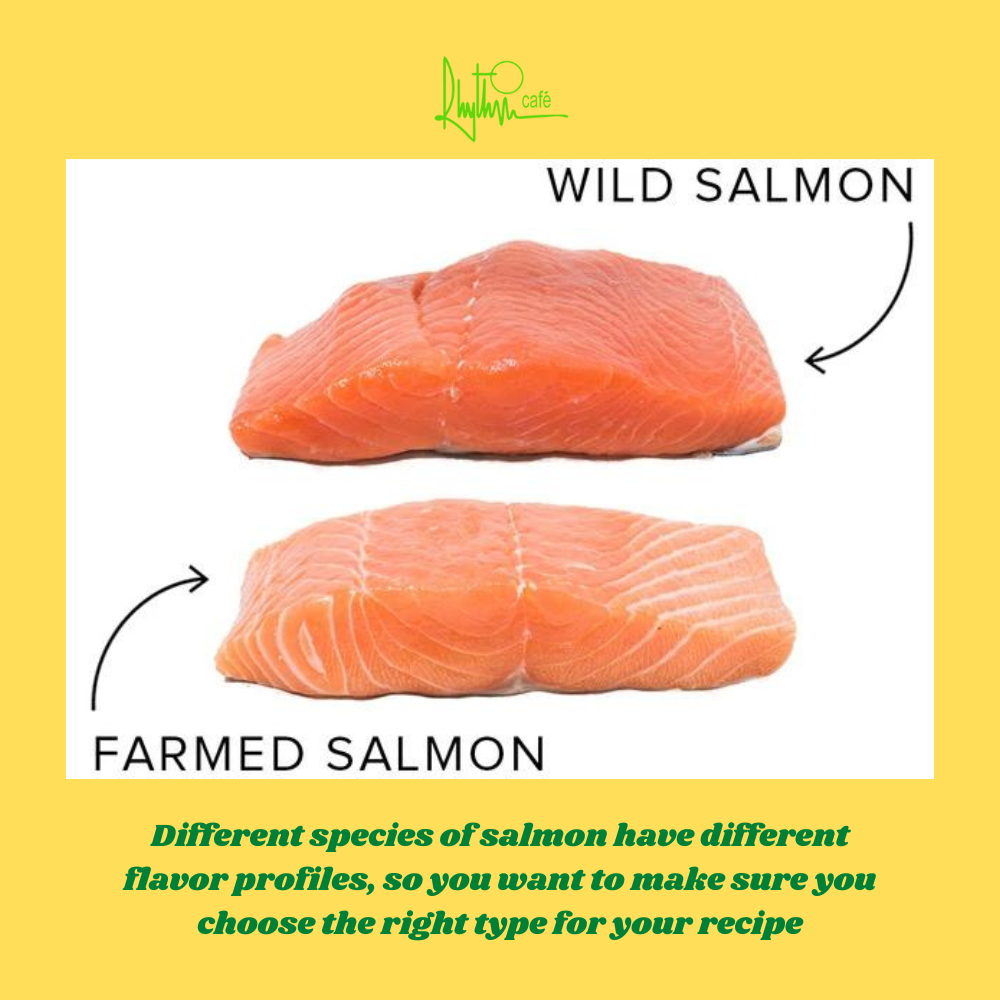
When preparing salmon, be sure to trim away any visible fat or skin before cooking. Doing so will help reduce fat and calories while maximizing flavor and nutrition. Additionally, discard the head and tail after cooking as these parts are often tougher than the rest of the fish.
Different Methods for cooking salmon (+ Recipes)
There are several different methods for cooking salmon, including baking, roasting, grilling, sautéing and poaching.
Here are some recipes to get you started:
1- Grilled Salmon with Lemon Herb Sauce
Preheat a grill to medium-high heat. Place the salmon fillets on a lightly oiled grilling rack. Grill for 5-7 minutes, or until lightly charred and cooked through. In a small bowl, combine lemon juice, olive oil, garlic, parsley, basil and thyme. Brush the salmon with the sauce during the last few minutes of cooking.
2- Baked Salmon with Creamy Dill Sauce
Preheat oven to 400°F (204°C). Place the salmon fillets in a lightly greased baking dish. Bake for 20 minutes, or until cooked through. Meanwhile, prepare the creamy dill sauce by combining Greek yogurt, lemon juice, garlic and fresh dill in a small bowl. Spread over the cooked salmon before serving.
3- Poached Salmon with Honey Mustard Sauce
Bring a large pot of salted water to a gentle simmer. Gently add the salmon fillets and poach for 6-8 minutes, or until cooked through. In a small bowl, combine Dijon mustard, honey, lemon juice and garlic. Drizzle over the cooked salmon before serving.
4- Pan-Fried Salmon with Lemon Butter Sauce
Heat a large skillet over medium-high heat. Add butter and swirl to coat the pan. Place salmon fillets in the pan and cook for 3-5 minutes per side, or until golden brown and cooked through. Transfer to a plate. In the same skillet, reduce heat to low and add lemon juice, garlic and capers. Simmer for 2 minutes, or until it forms a thick sauce. Drizzle over the cooked salmon before serving.
5- Roasted Salmon with Asian-Style Glaze
Preheat oven to 425°F (218°C). Place the salmon fillets in a lightly greased baking dish. Roast for 20 minutes, or until cooked through. Meanwhile, prepare the glaze by combining soy sauce, honey, garlic and ginger in a small bowl. Brush over the cooked salmon before serving.
6- Pan-Seared Salmon with Pesto Sauce
Heat a large skillet over medium-high heat. Add butter and swirl to coat the pan. Place salmon fillets in the pan and cook for 3-5 minutes per side, or until golden brown and cooked through. Transfer to a plate. In the same skillet, reduce heat to low and add pesto sauce. Simmer for 2 minutes, or until it forms a thick sauce. Drizzle over the cooked salmon before serving.
7- Salmon en Papillote
Preheat oven to 400°F (204°C). Place the salmon fillets on a piece of parchment paper. Top with lemon slices, fresh herbs and butter. Fold the edges of the parchment paper together to form a sealed pouch. Bake for 15-20 minutes, or until cooked through. Serve with your favorite sides!
No matter which cooking method you choose, always remember to adjust the ingredients and seasonings according to your taste preferences. Serve your cooked salmon with a variety of side dishes and enjoy!
>> See more:
- How many slices in 16 inch pizza
- How long does it take for Ice Cubes to freeze
- How long to Boil Brats
FAQs How long is cooked salmon good for
Can I refreeze previously frozen salmon?
No, refreezing previously frozen cooked salmon is not recommended. While it is safe to consume thawed cooked salmon that has been stored in the refrigerator for several days, refreezing cooked salmon can cause the texture and flavor of the fish to deteriorate.
Can I eat salmon 5 days a week?
Due to its high levels of omega-3 fatty acids, salmon can be a healthy part of your diet. However, it is generally recommended to consume no more than 2-3 servings of fish per week. Additionally, consult with your healthcare provider before increasing the number of servings you consume. This will help you ensure that you are getting all the essential nutrients your body needs.
Can I have poisoning after I eat cooked salmon?
No, it is unlikely that you will experience food poisoning after consuming cooked salmon. However, if the fish has been improperly stored or handled, there may be a risk of bacterial contamination which can cause foodborne illnesses. To reduce this risk, make sure to purchase quality fish from a reputable source and store it properly in your fridge for no more than 3-4 days. Additionally, always reheat cooked salmon to at least 165°F (74°C). If you experience any signs of food poisoning after consuming cooked salmon, seek medical attention immediately.
Can I reheat cooked salmon more than 2 times?
No, it is not recommended to reheat cooked salmon more than 2 times. Doing so can cause the texture and flavor of the fish to deteriorate, leading to a decrease in quality and safety. Additionally, reheating cooked salmon more than 2 times increases your risk of foodborne illnesses due to bacterial contamination. How long is cooked salmon good for? To ensure the highest quality and safety, only reheat cooked salmon once. If you would like to enjoy it more than one time, store it properly in the fridge for no more than 3-4 days and always reheat it to at least 165°F (74°C).
Is it safe to eat cold cooked salmon?
Yes, cold cooked salmon can be safe to eat as long as it has been properly stored and handled. If the fish has been in the fridge for no more than 3-4 days, it is best to reheat it to at least 165°F (74°C) before consuming. This will help reduce your risk of any potential foodborne illnesses. Additionally, make sure to double check that your fridge is set at 40°F (4°C) or lower when storing cooked salmon. If you would like to consume cold cooked salmon, it is best to do so as soon as possible after cooking. This will help ensure the highest quality and safety of the fish.
How long should I cook fresh or frozen salmon?
Cooking times may vary depending on the thickness of the salmon, but a general guideline is to cook fresh or frozen salmon for 10 minutes per inch (2.5 cm) of thickness at 350°F (177°C). For fillets, start checking for doneness after 7-9 minutes of cooking.
Is it safe to eat raw salmon?
Consuming raw salmon is not recommended as it may contain parasites or bacteria that can cause foodborne illnesses. If you would like to eat raw salmon, make sure to purchase sushi-grade fish from a reputable source and freeze it prior to consumption. This will kill any potential parasites or bacteria before eating. Additionally, seek the advice of your healthcare provider before consuming raw or undercooked fish.
Is salmon good after 5 days in the fridge?
Although salmon can last for up to 5 days in the refrigerator, it is best consumed as soon as possible.
How long is leftovers cooked salmon good for? Eating leftovers within 3-4 days of cooking is recommended to ensure the highest quality and avoid any potential foodborne illnesses. Furthermore, make sure to double check that your fridge is set at 40°F (4°C) or lower when storing and reheating cooked salmon.
Is it OK to eat leftover salmon?
Yes, it is safe to eat leftover cooked salmon as long as it has been properly stored and handled. To ensure the highest quality and safety, leftovers should be consumed within 3-4 days of cooking. Additionally, make sure to double check that your fridge is set at 40°F (4°C) or lower when storing and reheating cooked salmon.
Can salmon last 7 days in the fridge?
While cooked salmon can typically last up to 3-4 days in the fridge, it is generally not recommended to keep it for 7 days. After this amount of time, the salmon may have lost its quality and freshness and may not be safe to eat.
Can cooked salmon stay in fridge for 9 days?
No, cooked salmon should not be kept in the fridge for 9 days. Salmon is highly perishable and can spoil quickly if not stored properly. To ensure the highest quality and safety, leftovers should be consumed within 3-4 days of cooking.
Conclusion
Cooked salmon can last up to 2 days in the refrigerator and 3 months in the freezer when stored correctly. Make sure you wrap it tightly in plastic wrap or aluminum foil so no air can get in, label it with the date that it was cooked, and refrigerate any leftovers for later meals. We hope this information helps you better understand how long is cooked salmon good for and storage of cooked salmon. Remember to always practice safe food handling protocols like washing your hands before and after handling food, and following the proper cooking temperatures for fish. With these tips in mind, you can make sure that your cooked salmon stays fresh and delicious for as long as possible!
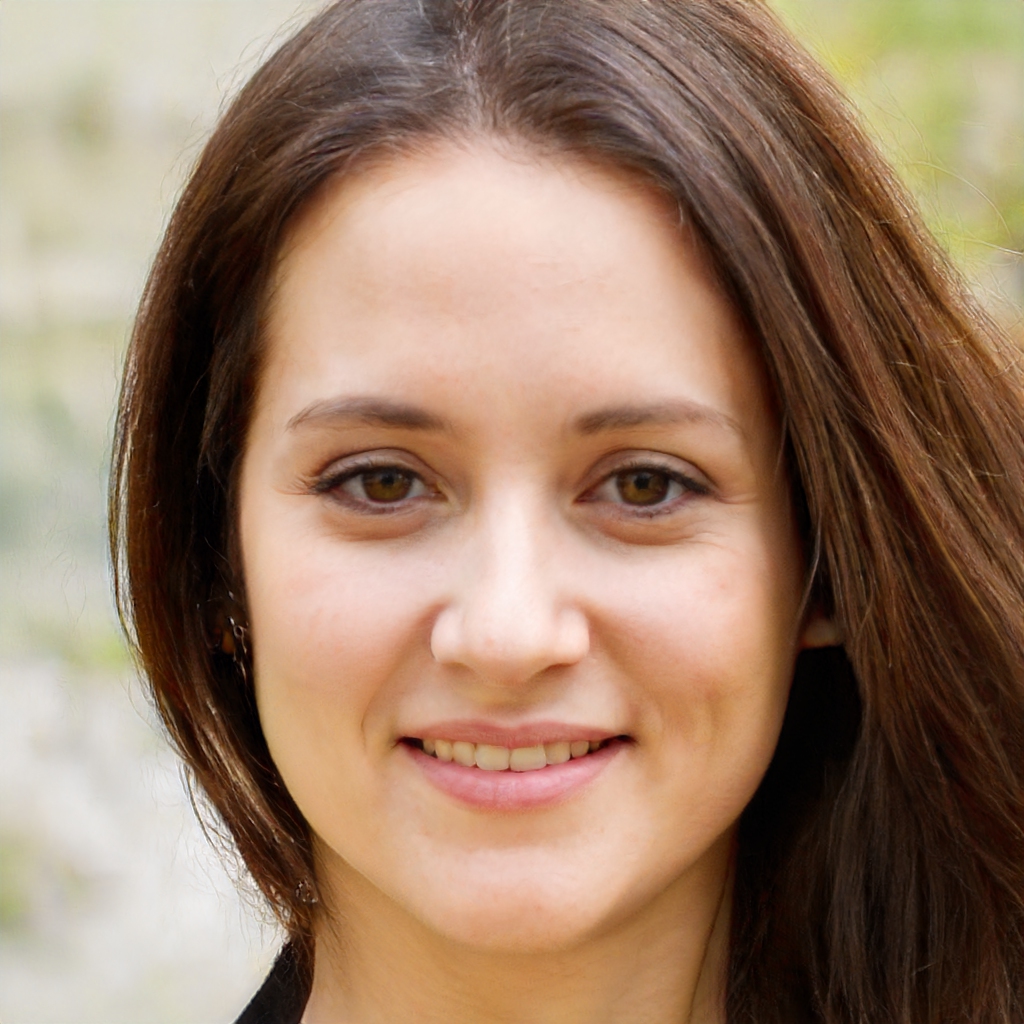
Leslie Fowler is the founder of Rhythm Cafe, a barbecue restaurant with over 15 years of experience. Leslie is an exceptional pitmaster and grill expert, specializing in smoking briskets and pork shoulders on charcoal, wood, or propane grills/smokers. Leslie has also tried out almost every model of kitchen appliance available on the market, making her an authority on grills and smokers.
